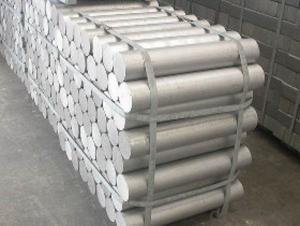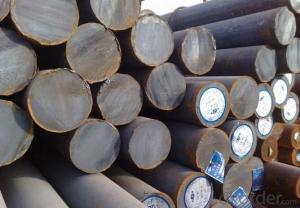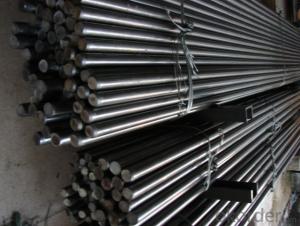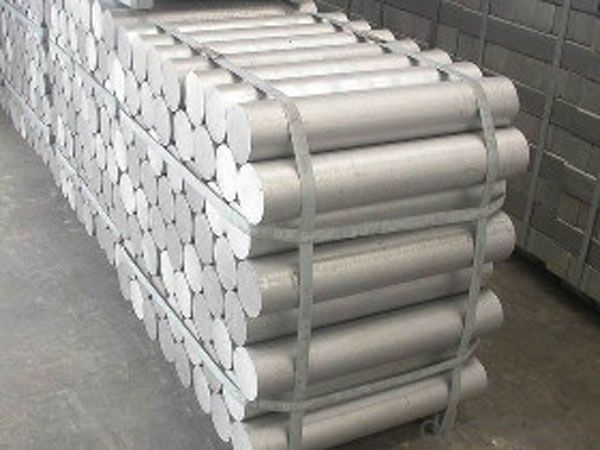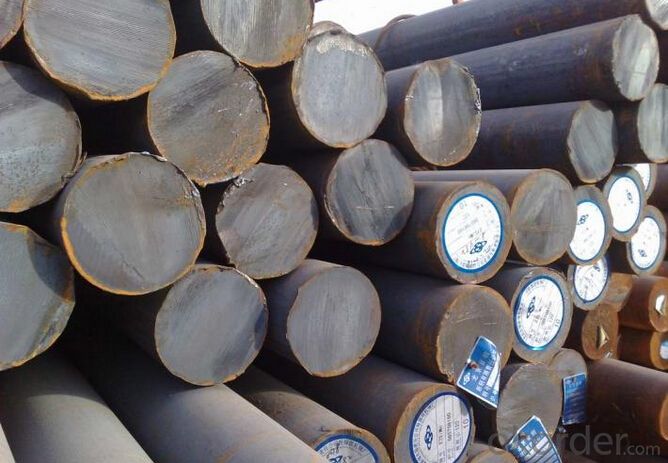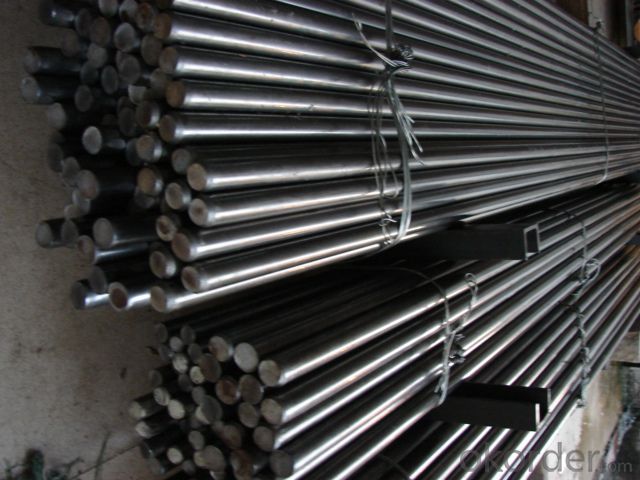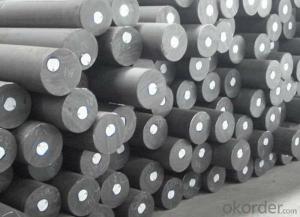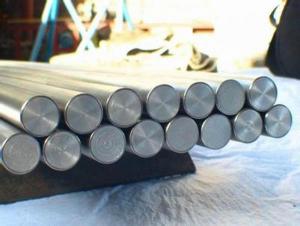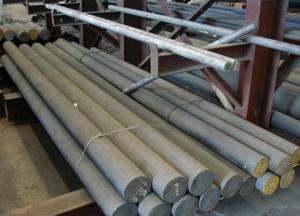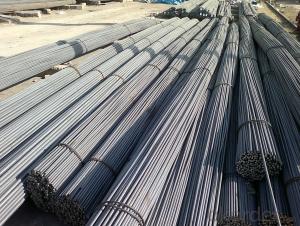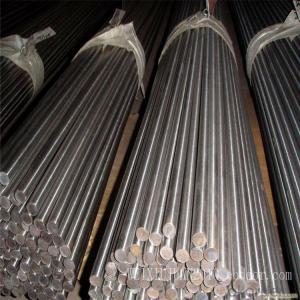Carbon Steel Structural Black or Galvanized Round Bar
- Loading Port:
- China main port
- Payment Terms:
- TT OR LC
- Min Order Qty:
- 30 m.t.
- Supply Capability:
- 10000 m.t./month
OKorder Service Pledge
OKorder Financial Service
You Might Also Like
Specification
Carbon Steel Structural Black or Galvanized Round Bar
Product Information:
1.Description:Carbon Steel Rod/Carbon Steel Bar,carbon steel rod,carbon steel shaft,mild steel bar, mild steel shaft,ms bar
2.Specification:
ASTM 1005,1006,1008,1010,1015,1020,1025,1030,1035,1040,1045,1050,1055,1060,1065,1070,1080,1084,
1016,1022
DIN Ck10,Ck15,Ck22,Ck25,Ck30,Ck35,Ck40,Ck45,Ck50, 30Mn4,40Mn4
BS 040A04,095M15,045M10,080A40,045M10,080M50
Standard GB/T799,ASTM A29,A108,A321,A575,BS970,DIN1652,JIS G4051
3.Section shape:Round
4.LengthAs your required
5.Application:Carbon steel rod applies to chemical industry, shipping industry,
manufacturing industry,construction,decorate Industry,electric power,
pump shafts, sanitary wares,furniture handles,boiler,high temperature
resistant,low temperature resistant, corrosion resistant.
Product Overviews:
| Product Name | Typical Grades | Diameter(mm) | Standard adopted |
| Carbon Steel | 20 (1020/S20C/C22) | Ø16-Ø300 | GB/SAE/JIS/DIN |
| 40 (1040/S40C/C40) | |||
| 45 (1045/S45C/C45) | |||
| Bearing Steel | GCr9 (51100/SUJ1) | Ø12-Ø250 | |
| GCr15 (52100/SUJ2/100Gr6) | |||
| GCr9SiMn (A485-Gr.1/SUJ3) | |||
| Cr-Mo Steel | 20Cr (5120/SCr420H/20Cr4) | Ø12-Ø250 | |
| 40Cr (5140/SCr440/41Cr4) | |||
| 42CrMo(4140/SCM440/42CrMo4) | |||
| Gear Steel | 20CrNiMo | Ø16-Ø600 | |
| 20CrMn(5115/SMnC420/20MnCr5) | |||
| 20CrNiMo(8620/SNCM220/20CrMiMo2) |
Product Show:

Our Advantages:
· Industry experience over 20 years.
· Shipment of goods -More than 70 countries worldwide.
· The most convenient transport and prompt delivery.
· Competitive price with best service.
· High technical production line with top quality products.
· High reputation based on best quality products.
With our experienced, enthusiastic and dynamic staffs, we assure to bring you the products with best quality, reasonable prices and good after-sales services under the motto: Friends First, Business After.
Communication, Experience, Expertise and Best efforts are our Promises to you.
- Q: How does special steel ensure product traceability?
- Product traceability is guaranteed in special steel through a variety of measures and processes implemented during production and supply chain management. To begin with, detailed records of the production process are maintained by special steel manufacturers. These records encompass information on the raw material source, specific production techniques utilized, and the testing and inspection procedures carried out at each stage. By possessing these records, a comprehensive traceability is achieved as they provide a clear historical account of each product from its inception to its final form. Special steel manufacturers also adopt robust quality control systems that involve assigning unique identification codes or markings to each product. These codes aid in tracking the product throughout its lifecycle, facilitating easy identification and traceability. Furthermore, advanced technology systems such as barcode scanning, radio frequency identification (RFID), or blockchain are often employed by special steel manufacturers to monitor and trace their products. These systems enable real-time monitoring and recording of product movements, thereby ensuring accurate traceability and transparency. Additionally, special steel manufacturers maintain strong relationships with their suppliers and customers, establishing a transparent and traceable supply chain. They collaborate closely with suppliers to validate the origin and quality of raw materials, while also working closely with customers to provide them with detailed information regarding the product's manufacturing process and its journey through the supply chain. In conclusion, special steel manufacturers prioritize product traceability by implementing stringent record-keeping systems, advanced technology solutions, and maintaining transparent relationships with suppliers and customers. These measures not only guarantee the quality and reliability of special steel products, but also provide customers with assurance regarding the origin and authenticity of the product.
- Q: What are the common quality control measures for special steel?
- Some common quality control measures for special steel include performing chemical composition analysis, conducting mechanical property testing, inspecting surface defects, ensuring dimensional accuracy, and conducting non-destructive testing such as ultrasonic or magnetic particle inspection. Additionally, the use of standardized quality control systems, such as ISO 9001, can aid in ensuring consistent and reliable production of special steel.
- Q: What are the different types of high-speed steel?
- There are several different types of high-speed steel, including M1, M2, M42, and T1. Each type has its own unique composition and properties, making them suitable for various applications in cutting tools, drills, and machining operations.
- Q: How does special steel contribute to the oil and gas aftermarket industry?
- Special steel plays a crucial role in the oil and gas aftermarket industry due to its unique properties and capabilities. Firstly, special steel is highly resistant to corrosion, making it ideal for use in the harsh and corrosive environments commonly found in the oil and gas sector. This resistance to corrosion ensures that the equipment and components made from special steel have a longer lifespan, reducing the need for frequent replacements and maintenance. Additionally, special steel offers high strength and durability, allowing it to withstand the extreme pressures and temperatures encountered in oil and gas operations. This strength ensures that the equipment and components made from special steel can operate reliably and efficiently, even under demanding conditions. Moreover, special steel can be tailored to meet the specific needs of the oil and gas industry. With its various grades and compositions, special steel can be customized to possess specific properties such as resistance to sulfide stress cracking, hydrogen embrittlement, and high-temperature oxidation. These customized properties make special steel suitable for critical applications such as wellheads, pipelines, valves, and other equipment used in the oil and gas aftermarket industry. Furthermore, special steel enables the production of complex and intricate components that are essential for the oil and gas sector. Its excellent machinability and weldability allow for the creation of precision-engineered parts, ensuring the efficient and reliable operation of oil and gas equipment. In summary, special steel contributes significantly to the oil and gas aftermarket industry by providing corrosion resistance, high strength, durability, customization options, and the ability to manufacture intricate components. These properties make special steel indispensable in ensuring the safety, reliability, and efficiency of operations in the oil and gas sector.
- Q: What are the challenges in forming special steel?
- Forming special steel poses several challenges due to its unique characteristics and properties. Some of the main challenges include: 1. High melting point: Special steels often have high melting points, which require specialized equipment and processes to heat and form the material. This can lead to increased energy consumption and cost. 2. Alloy composition: Special steels are typically alloyed with various elements to enhance their properties, such as strength, hardness, and corrosion resistance. However, the precise control of alloy composition can be challenging, as minor variations can significantly affect the material's properties. 3. High carbon content: Certain special steels, such as tool steels, contain high carbon content to enhance hardness and wear resistance. However, this high carbon content makes the material more prone to cracking during forming processes like forging or rolling. Special care must be taken to prevent these cracks and ensure the desired shape is achieved. 4. Heat treatment requirements: Special steels often require specific heat treatment processes, such as quenching and tempering, to achieve the desired mechanical properties. These processes can be complex and require precise control of temperature, time, and cooling rates. Failure to properly carry out heat treatment can result in poor material performance or even structural failure. 5. Surface finish and dimensional accuracy: Special steels are often used in applications where surface finish and dimensional accuracy are critical, such as in the aerospace or automotive industry. Achieving the required surface finish and dimensional accuracy during forming operations can be challenging, requiring advanced tooling and precision machining techniques. 6. Specialized equipment and expertise: Special steels may require specialized equipment and expertise to form, such as high-pressure hydraulic presses, induction heating equipment, or vacuum furnaces. These specialized tools and processes add complexities and costs to the manufacturing process. Despite these challenges, forming special steels is essential in various industries where their unique properties are required. Manufacturers continuously invest in research and development to overcome these challenges and improve the forming processes of special steels.
- Q: Can special steel be used in aerospace turbine components?
- Aerospace turbine components, like blades, vanes, and disks, need strong materials to withstand tough conditions. Special steel, also known as high-performance alloy steel, fits the bill. It has excellent mechanical properties, like high strength, hardness, and temperature resistance. These qualities make it perfect for aerospace turbine components, which face extreme temperatures, pressures, and stress. Jet engines rely on turbine components to work properly, so they need materials that can handle the tough conditions. Special steel alloys, like nickel-based superalloys, are commonly used because they can maintain their strength and integrity at high temperatures. Plus, special steel is lightweight but strong, so it helps make durable yet light turbine components. This improves the efficiency and performance of aerospace systems. Special steel alloys also resist corrosion, oxidation, and fatigue, which are crucial for the long-term reliability and safety of turbine components. These materials go through rigorous testing and certification to meet aviation industry standards. In conclusion, special steel is a great choice for aerospace turbine components. Its exceptional mechanical properties and resistance to extreme conditions make it reliable and safe. It plays a vital role in ensuring the efficiency and safety of turbine systems in aerospace applications.
- Q: What are the requirements for special steel used in surgical instruments?
- The requirements for special steel used in surgical instruments are quite stringent due to the critical nature of their application in medical procedures. First and foremost, the steel must have excellent corrosion resistance to withstand the repeated exposure to body fluids and chemicals used in sterilization processes. This ensures that the instruments remain durable, hygienic, and safe for use. Another essential requirement is high strength and hardness, as surgical instruments must be able to withstand the forces exerted during procedures without bending, breaking, or losing their sharpness. Additionally, the steel should possess excellent wear resistance to maintain its cutting edge for an extended period, reducing the need for frequent sharpening or replacement. Biocompatibility is another crucial factor for surgical instruments. The steel should not cause any adverse reactions when in contact with living tissue or fluids, minimizing the risk of infection or complications for patients. This requires the absence of harmful elements or impurities that may trigger allergic responses or toxicity. Furthermore, the steel used in surgical instruments must be highly sterilizable. It should be capable of withstanding high temperatures during autoclaving or other sterilization methods without undergoing significant changes in its physical or mechanical properties. Lastly, the steel should be easily workable, allowing for precision manufacturing processes such as forging, machining, and polishing to create intricate instrument designs. This ensures that surgical instruments have the necessary shape, size, and surface finish required to perform specific tasks effectively. Overall, the requirements for special steel used in surgical instruments encompass corrosion resistance, strength, hardness, wear resistance, biocompatibility, sterilizability, and workability to ensure the instruments meet the demanding standards of the medical field.
- Q: How does special steel perform in terms of weldability?
- Special steel generally performs well in terms of weldability. It is specifically designed to have good weldability characteristics, which means it can be easily welded without much difficulty or the need for specialized welding techniques. This makes it a preferred choice for many welding applications, as it allows for efficient and reliable joining of different components or structures.
- Q: How does special steel comply with international standards?
- Special steel is a type of steel that is specifically designed and manufactured to possess exceptional properties and performance characteristics. When it comes to complying with international standards, special steel undergoes a rigorous process to ensure its quality and adherence to the established norms. Firstly, special steel production adheres to international standards through the selection of raw materials. The composition and quality of the raw materials used in the manufacturing process are carefully controlled and tested to meet the specifications outlined by international standards organizations. This ensures that the special steel produced is of the desired quality and possesses the required mechanical properties. Secondly, special steel manufacturers follow standardized production processes. These processes are designed in accordance with international guidelines and standards to guarantee consistency and traceability. Through the use of advanced technologies and quality control measures, special steel manufacturers can monitor and control every stage of production, from melting and casting to rolling and heat treatment. This ensures that the final product meets the required standards in terms of chemical composition, mechanical properties, and dimensional tolerances. Furthermore, special steel undergoes stringent testing and inspection procedures to validate its compliance with international standards. This includes various destructive and non-destructive testing methods such as ultrasonic testing, hardness testing, and microstructure analysis. These tests are conducted by certified laboratories and independent third-party agencies to ensure unbiased and accurate results. In addition, special steel manufacturers often have their production processes and quality management systems audited and certified by recognized bodies, such as ISO (International Organization for Standardization), to demonstrate their commitment to compliance with international standards. It is also worth mentioning that special steel manufacturers actively participate in international standardization committees, such as ASTM International and the International Organization for Standardization (ISO). By engaging in these committees, they can contribute to the development and revision of international standards, ensuring that their products remain up to date and in line with the latest industry requirements. In conclusion, special steel complies with international standards through careful selection of raw materials, adherence to standardized production processes, rigorous testing and inspection procedures, and active participation in international standardization committees. By following these measures, special steel manufacturers demonstrate their commitment to producing high-quality products that meet the stringent requirements of international standards.
- Q: How is special steel used in the telecommunications industry?
- Special steel is used in the telecommunications industry for various applications, such as the construction of transmission towers, antenna supports, and satellite equipment. Its high strength, corrosion resistance, and durability make it ideal for withstanding harsh environmental conditions and ensuring the stability and reliability of telecommunications infrastructure.
Send your message to us
Carbon Steel Structural Black or Galvanized Round Bar
- Loading Port:
- China main port
- Payment Terms:
- TT OR LC
- Min Order Qty:
- 30 m.t.
- Supply Capability:
- 10000 m.t./month
OKorder Service Pledge
OKorder Financial Service
Similar products
Hot products
Hot Searches
Related keywords
